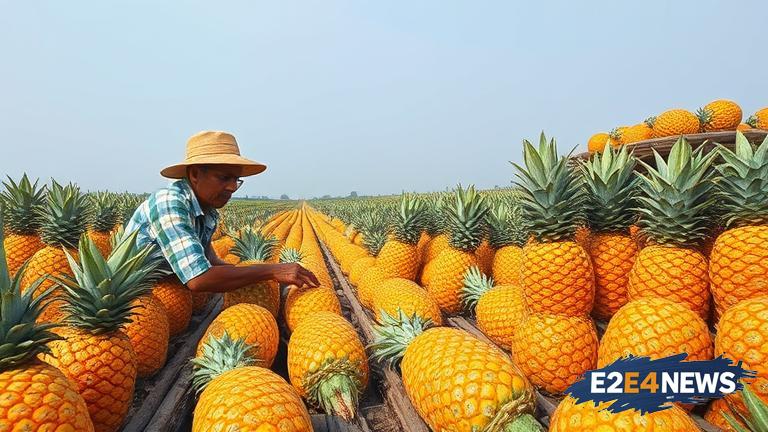Bangladesh, known for its lush green landscapes and fertile soil, has emerged as a significant producer of pineapples in recent years. The country’s pineapple heartland, located in the southeastern region, is home to numerous farmers who cultivate this juicy fruit. With the growing demand for pineapples in China, Bangladeshi farmers are now eyeing the Chinese market as a potential destination for their produce. The Chinese market, with its vast population and increasing appetite for exotic fruits, presents a lucrative opportunity for Bangladeshi pineapple farmers. To capitalize on this trend, farmers in Bangladesh are focusing on improving the quality and quantity of their pineapples, while also exploring ways to increase their exports to China. The Bangladeshi government has also taken steps to support the farmers, providing them with training and resources to enhance their productivity and competitiveness. Furthermore, the government has established trade agreements with China, aiming to facilitate the export of pineapples and other agricultural products. As a result, Bangladeshi pineapple farmers are optimistic about their prospects, anticipating a significant increase in exports to China in the coming years. The potential benefits of tapping into the Chinese market are substantial, with farmers expecting to earn higher prices for their produce and increase their overall income. Moreover, the growth of the pineapple industry in Bangladesh is likely to have a positive impact on the country’s economy, creating new job opportunities and stimulating economic growth. In addition to the economic benefits, the expansion of the pineapple industry is also expected to contribute to the country’s food security, providing a stable source of income for farmers and their families. The pineapple farmers in Bangladesh are also exploring new varieties of pineapples, which are more suitable for the Chinese market, in order to increase their competitiveness. The farmers are also adopting new technologies, such as drip irrigation and greenhouse farming, to improve the quality and yield of their pineapples. The use of these technologies is expected to reduce the environmental impact of farming, while also increasing the efficiency and productivity of the farmers. Moreover, the Bangladeshi government is also providing support to the farmers to adopt these new technologies, through subsidies and training programs. The growth of the pineapple industry in Bangladesh is also expected to have a positive impact on the country’s rural development, as it will provide new opportunities for rural communities to participate in the economy. The industry is also expected to contribute to the country’s poverty reduction efforts, as it will provide a stable source of income for farmers and their families. In conclusion, the Bangladeshi pineapple farmers are poised to tap into the lucrative Chinese market, with the potential to increase their exports and boost their economy. With the support of the government and the adoption of new technologies, the farmers are confident that they can capitalize on this opportunity and achieve significant economic benefits. The growth of the pineapple industry in Bangladesh is a positive development, with the potential to contribute to the country’s economic growth, food security, and rural development. As the industry continues to grow, it is likely to have a positive impact on the lives of farmers and their families, providing them with a stable source of income and improving their overall well-being. The future of the pineapple industry in Bangladesh looks promising, with the potential for significant growth and development in the coming years. The industry is expected to play an important role in the country’s economy, providing new opportunities for farmers and rural communities to participate in the economy. With the right support and policies, the Bangladeshi pineapple farmers are confident that they can achieve their goals and capitalize on the opportunities presented by the Chinese market.





